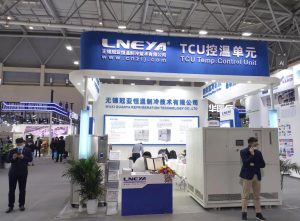Qual é a diferença entre os refrigeradores de glicol e os refrigeradores arrefecidos a água?
Tanto os refrigeradores de glicol como os refrigeradores podem ser utilizados para dissipar satisfatoriamente o calor gerado durante a produção. A diferença fundamental entre os dois tipos de chillers é a variação do seu ponto de congelação e das suas capacidades de transferência de calor. ...
Pure ethylene glycol or a mixture of ethylene glycol and water has a much lower freezing point than pure water. This means that glycol-based chillers are better suited for low-temperature environments. In contrast, water has a better ability to retain and conduct heat in the associated process than glycol mixtures. As a result, the heat transfer efficiency for water chillers will be higher than for glycol chillers.
Water: Using water as a coolant is an economical method as water is readily available at minimal cost in most cases. Alternatively, purified water (deionized water, reverse osmosis) can be used in water-based chillers for greater cooling efficiency.
Ethylene Glycol: Ethylene glycol-based coolants consist of either ethylene glycol or propylene glycol. Although the two variants have similar physical properties, they should never be mixed. The main benefits of glycol coolants are improved corrosion resistance and freeze protection.
Why use ethylene glycol for cooling?
Using a glycol-water mixture as a coolant has several advantages over using plain water as a coolant. These advantages are due to its unique physical properties, which include a lower freezing point than water.
Recomendações relacionadas
-
Collocation Requirements For Lab Water Chiller
1149The lab water chiller is a relatively advanced cryopreservation equipment, which is suitable for blood stations, hospitals, health and epidemic prevention systems, scientific research institutes, electronic industry, chemical medicine, biological ...
Ver pormenores -
Aplicação de equipamento de aquecimento e refrigeração de laboratório
856Utilização de equipamento de refrigeração e aquecimento em laboratório
Ver pormenores -
-
Seleção do modelo e tamanho do circulador de arrefecimento e aquecimento (sistema de controlo da temperatura da instalação piloto)
1049O circulador de arrefecimento e aquecimento adopta refrigeração mecânica, o tubo de aquecimento de baixa temperatura aquece a alta temperatura e a bomba enlatada é utilizada como bomba de circulação. A circulação de líquido de todo o sistema é fechada e consiste...
Ver pormenores
 LNEYA Refrigeradores industriais Fabricante Fornecedor
LNEYA Refrigeradores industriais Fabricante Fornecedor












